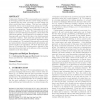Free Online Productivity Tools
i2Speak
i2Symbol
i2OCR
iTex2Img
iWeb2Print
iWeb2Shot
i2Type
iPdf2Split
iPdf2Merge
i2Bopomofo
i2Arabic
i2Style
i2Image
i2PDF
iLatex2Rtf
Sci2ools
113
click to vote
RECSYS
2009
ACM
2009
ACM
Context-based splitting of item ratings in collaborative filtering
Collaborative Filtering (CF) recommendations are computed by leveraging a historical data set of users’ ratings for items. It assumes that the users’ previously recorded ratings can help in predicting future ratings. This has been validated extensively, but in some domains item ratings can be influenced by contextual conditions, such as the time or the goal of the item consumption. This type of information is not exploited by standard CF models. This paper introduces and analyzes a novel pre-filtering technique for context-aware CF called item splitting. In this approach, the ratings of certain items are split, according to the value of an item-dependent contextual condition. Each split item generates two fictitious items that are used in the prediction algorithm instead of the original one. We evaluated this approach on real world and semi-synthetic data sets using matrix-factorization and nearest neighbor CF algorithms. We show that item splitting can be beneficial and its p...
Related Content
| Added | 28 May 2010 |
| Updated | 28 May 2010 |
| Type | Conference |
| Year | 2009 |
| Where | RECSYS |
| Authors | Linas Baltrunas, Francesco Ricci |
Comments (0)

